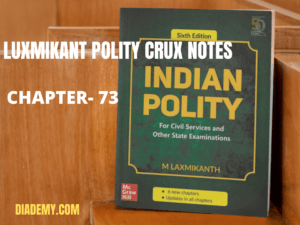
Luxmikant Polity Crux Notes Chapter 73
Gain a deep understanding of the intricacies of Indian polity with Luxmikant Polity Crux Notes Chapter 73. Explore essential topics and concepts in this comprehensive guide to bolster your knowledge and excel in your studies.
Electoral Reforms
| COMMITTEES RELATED TO ELECTORAL REFORMS | Various committees and commissions which have examined our electoral system, election machinery as well as election process and suggested reforms are mentioned here.
· J.S. Verma Committee Report on Amendments to Criminal Law (2013). · Law Commission of India 244th Report on Electoral Disqualifications (2014). · Law Commission of India 255th Report on Electoral Reforms (2015). |
| ELECTORAL REFORMS BEFORE 1996 | Lowering of Voting Age– The 61st Constitutional Amendment Act, 1988 reduced the voting age from 21 years to 18 years to engage in the preparation revision & electoral office.
Increase in Number of Proposers– the Rajya Sabha and state legislative council has been increased to 10 per cent of the electors of the constituency or 10 electors RS & SLC. Deputation to Election Commission– In 1988, a provision was made the officers and staff engaged in preparation, revision and correction of electoral rolls for elections. Electronic Voting Machines– The EVMs were used for the first time in 1998 on experimental basis. Booth Capturing– In 1989; (i) seizure of a polling station and making polling authorities surrender ballot papers or voting machines (ii) taking possession of polling station and allowing only one’s own supporters to exercise their franchise. Elector’s Photo Identity Card (EPIC)– A decision was taken by the Election Commission in 1993 to issue photo identity cards to electors. |
| ELECTORAL REFORMS OF 1996 | In 1990, V P Singh appointed a committee on electoral reforms under the chairmanship of Dinesh Goswami, Reported were implemented in 1996.
Some of these recommendations were implemented in 1996. These are explained here. 1. Listing of Names of Candidates- The candidates contesting elections are to be classified into three categories. i. Candidates of recognised political parties ii. Candidates of registered-unrecognised political parties iii. Other (independent) candidates
2. Disqualification for Insulting the National Honour Act- Under the Prevention of Insults to National Honour Act of 1971 is disqualified.
3. Prohibition on the Sale of Liquor- The period of 48 hours ending with hour fixed for the conclusion of poll. Any person who violates this rule is to be punished up to 6 months or with fine up to 2,000 or with both.
4. Number of Proposers- 10 registered electors party
5. Death of a Candidate – Earlier– the election stops or current option to propose another candidate within seven days.
6. Time Limit for By-Elections- by-elections are to be held within 6 months.
7. Holiday to Employees on the Polling Day- This rule applies even to the daily wagers. Any employer who violates this rule is to be punished with a fine up to 500.
8. Prohibition of Arms – entering into the neighbourhood of a polling station with any kind of arms – cognizable offence. Punishable with imprisonment up to 2 years or fine or with both
9. Effective Campaigning Period Reduced – minimum gap between last date for withdrawal of candidature and polling date has been reduced from 20 to 14 days |
| ELECTORAL REFORMS AFTER 1996 | · No. of elector & proposer for POI – 10 (inc) – 50
· No. of elector & proposer for V POI – 5 (inc) – 20 · LIC, university government undertaking will help. · Postal ballot, opt to vote through Prony for armed solider. · Deceleration of all criminal past, Assets etc by candidate · Rajya Sabha Domicile rule removed. · 2003 open ballot system instead of secret to crup horse trading. · Travelling expenditure of campaigning leader exclude. · Free supply of electoral rolls. · Parties can accept contribution. · Allocation of fine on electronic media. · Braille signage feature for visually impaired votes. |
| ELECTORAL REFORMS SINCE 2010 | 1. Restrictions Imposed on Exit Polls-
– During the notified period – Voting Rights to citizen of India. 2. Increase in security deposit- – L.S. = 10000 – 25000 (general) – L.S. + 5000 – 12,500 for SC – State legislative assembly increased from 5,000 to 10,000 for the general candidates and from 2,500 to 5,000 for the SC and ST candidates. 3. Appellate Authority within the District- In 2009, 4. Online Enrolment in the Electoral Roll- 2013 5. Introduction of NOTA 6. Introduction of VVPAT 7. Persons in Jail or Police Custody Can Contest Elections 8. Immediate Disqualification of Convicted MPs and MLAs 9. Ceiling on Election Expenditure Increased 10. Photos of Candidates on EVMs and Ballot Papers 11. Voting Rights to Citizens of India Living Abroad |
Get all essential Crux notes by clicking here https://diademy.com/product/staticcrux/